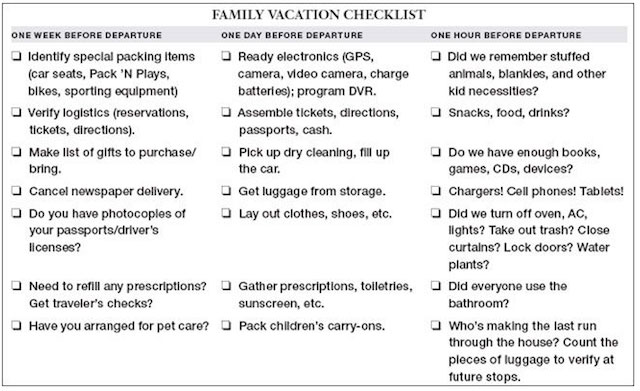The secrets of happy families
Dinnertime is more important than you think

A free daily email with the biggest news stories of the day – and the best features from TheWeek.com
You are now subscribed
Your newsletter sign-up was successful

Bruce Feiler's book — The Secrets of Happy Families: Improve Your Mornings, Rethink Family Dinner, Fight Smarter, Go Out and Play, and Much More — explores the hidden secrets of improving your family life.

Despite all of the recent research about individual happiness, a lot of life happiness comes from spending time with people you care about. In fact, it is the number one predictor of life satisfaction.
Simply put, happiness is other people, and the other people we hang around with most are our family. So how do we make sure we're doing that effectively? [The Secrets of Happy Families]
Adapt all the time
The Week
Escape your echo chamber. Get the facts behind the news, plus analysis from multiple perspectives.

Sign up for The Week's Free Newsletters
From our morning news briefing to a weekly Good News Newsletter, get the best of The Week delivered directly to your inbox.
From our morning news briefing to a weekly Good News Newsletter, get the best of The Week delivered directly to your inbox.
Almost everyone feels completely overwhelmed by the pace and pressures of daily life, and that exhaustion is exacting an enormous toll on family well-being. Survey after survey shows that parents and children both list stress as their number one concern. This includes stress inside as well as outside the home. And if parents feel harried, it trickles down to their children. Studies have shown that parental stress weakens children's brains, depletes their immune systems, and increases their risk of obesity, mental illness, diabetes, allergies, even tooth decay. [The Secrets of Happy Families]
Kids wish their parents were less tired and stressed.
Jeff Sutherland, implemented an agile approach at home.
People think it's natural to live in a world where everyone is dysfunctional. It's not. It's normal for people to be satisfied. All you have to do is remove the barriers that are making you unhappy and you'll be a lot happier. [The Secrets of Happy Families]
That sounds like inversion and it turns out that acknowledging that things can go wrong and introducing a system to address those things works the same in business and at home. Hello family meetings.
The centerpiece of the program is a weekly review session built on the principle of "inspect and adapt."
A free daily email with the biggest news stories of the day – and the best features from TheWeek.com
Three questions get asked:1. What things went well in our family this week?2. What things could we improve in our family?3. What things will you commit to working on this week? [The Secrets of Happy Families]
This is a mechanism for communication.
"What works about the family meeting," he said, "is that it's a regularly scheduled time to draw attention to specific behaviors. If you don't have a safe environment to discuss problems, any plan to improve your family will go nowhere." [The Secrets of Happy Families]
Sutherland went on to say "The purpose of the meeting is not to talk about each of you as individuals. It's to focus on how you're functioning as a family."
As well as talking about the things you want to focus on you need to talk about rewards and consequences too. Within limits, you need to let the kids decide.
Empowering children works.
A significant amount of recent brain research backs this up. Scientists at the University of California and elsewhere found that kids who plan their own time, set weekly goals, and evaluate their own work build up their prefrontal cortex and other parts of the brain that help them exert greater cognitive control over their lives. These so-called executive skills aid children with self-discipline, avoiding distractions, and weighing the pros and cons of their choices.By picking their own punishments, children become more internally driven to avoid them. By choosing their own rewards, children become more intrinsically motivated to achieve them. Let your kids take a greater role in raising themselves.One takeaway I got from agile is that whenever I see friends with checklists — chores, schedules, allowance — I ask whether the adults or the kids are doing the checking off. Invariably it's the adults. The science suggests there's a better way.To achieve maximum benefits, have the children do the scoring. They'll develop a much finer sense of self-awareness. Even if this approach doesn't work on every occasion, it's about teaching your kids an approach to problem solving they can carry with them the rest of their lives. [The Secrets of Happy Families]
Dinner matters
There is a right way to have family dinner: What you talk about matters as much as what you put in your mouth.
"When you start to look at the research, which is staggering," Laurie David, the Oscar-winning producer of An Inconvenient Truth and the author of The Family Dinner, says "you realize all the things you worry about as a parent can be improved just by sitting down to regular dinners."
A recent wave of research shows that children who eat dinner with their families are less likely to drink, smoke, do drugs, get pregnant, commit suicide, and develop eating disorders. Additional research found that children who enjoy family meals have larger vocabularies, better manners, healthier diets, and higher self-esteem. The most comprehensive survey done on this topic, a University of Michigan report that examined how American children spent their time between 1981 and 1997, discovered that the amount of time children spent eating meals at home was the single biggest predictor of better academic achievement and fewer behavioral problems. Mealtime was more influential than time spent in school, studying, attending religious services, or playing sports. [The Secrets of Happy Families]
It's not about the dinner, it's about the people. Use meals to share family history.
The more children knew about their family's history, the stronger their sense of control over their lives, the higher their self-esteem, and the more successfully they believed their families functioned. … (Marshall Duke) says that children who have the most balance and self-confidence in their lives do so because of what he and Robyn call a strong "intergenerational self." They know they belong to something bigger than themselves. [The Secrets of Happy Families]
More ideas? Try the 10-50-1 formula.
10. Aim for ten minutes of quality talk per meal. .. 50. Let your kids speak at least half the time. … 1. Teach your kids one new word every meal. [The Secrets of Happy Families]
The Warren Buffett Guide to Setting an Allowance
1. Show them the money. (Byron) Trott (Buffett called him "the only banker I trust") said most parents have an instinctive reluctance to be honest with their kids about money — how it's made, lost, invested, and spent. He said that 80 percent of college students have never had a conversation with their parents about managing money. Trott advises his clients to fling open the doors to the vault.
"I tell my clients that forcing their kids to have financial literacy is one of the most important things they can do," he said. He quoted statistics that say the more parents talk to their kids about debt, the less debt they rack up; the more they hear about savings, the more they sock away.
"What happens to a lot of families is they depend too much on osmosis," he continued. "I sat down with one of the richest women in America recently and told her she had to talk openly with her children. She said she didn't want to burden them with the truth, but burdening them with ignorance is really much worse."
2. Take off the training wheels. "One of the biggest problems I see in families," Trott said, "is a reluctance to let your kids make decisions for themselves." As an example, he cited the story of Jack Taylor, the founder of Enterprise Rent-A-Car, who with a net worth in excess of $9 billion has been ranked as high as the eighteenth richest American. When his son turned thirty-two, Taylor handed him the company and never looked back. "Most parents meddle," Trott said.
3. Accept their passions, any passions. Buffett is famous for not wanting to spoil his kids. Instead, after his wife gave each of their three kids $100 million, and the money didn't ruin them, Buffett gave each one a $1 billion foundation. Trott was privy to that decision, and I asked what he thought of it. Does money inherently spoil children?
"I don't think so," he said. "I've seen too many really rich kids who are great people. In my experience, great people are great because they find their passion. For some that's in business, but for others it's in philanthropy. One of Warren's sons is a farmer; another is a musician. Most families really don't let their kids follow their passions. They assume the parents' passion is the children's passion, and usually it's not. You should allow them to be outliers in their dreams."
4. Put them to work. There's a lot of vagueness in academic circles about children and money, but the research is clear that part-time jobs are great for kids. The Youth Development Survey in St. Paul, Minnesota, followed a number of children from ninth grade through their midthirties to determine whether childhood should be the sanctuary of play and learning or if work can be a productive part of it. The study found that those who work don't lose interest in school and don't cut back on family, extracurricular activities, or volunteering. They even become better at time management.
As the survey's lead researcher, Jeylan Mortimer, observed: The more "planful" adolescents are about their future, the more successful and satisfied they are likely to be as adults. Trott agreed. "The most successful adults I know were all involved in business at a young age," he said. "All of them. Warren believes it's the secret to success. Your kid has to be involved in business. Warren thinks I'm successful because I had a lawn mowing business, a clothing store, all these different businesses as a kid, so I understood money, even though I never studied economics. What he thinks is necessary for someone to be successful in business is early exposure to business. So if you really want your daughters to understand money, have them open a lemonade stand." [The Secrets of Happy Families]
Grandmothers rock
Well, at least mine does.
Countless studies have shown the extraordinary benefits grandmothers have on contemporary families. A meta-analysis of sixty-six studies completed in 1992 found that mothers who have more support from grandmothers have less stress and more well-adjusted children. The more involved the grandmothers are, the more involved dads are, too.
Now you see why Hardly called grandmothers humanity's "secret benefactors."
So what are these grandmothers actually doing? They're teaching children core social skills like how to cooperate, how to be compassionate, how to be considerate. Researchers at Brigham Young University in Utah interviewed 408 adolescents about their relationship with their grandparents. When grandparents are involved, the study found, the children are more social, more involved in school, and more likely to show concern for others. Also, as lead scientist Jeremey Yorgason said, parents take the lead in disciplining negative behavior, leaving grandparents free to encourage positive behaviors. [The Secrets of Happy Families]
Use checklists

"Peter Pronovost's miracle invention was not a drug, a device, or a procedure. It wasn't revolutionary at all. It's one of the oldest, most mundane things on earth. It's a checklist."
By adding checklists with preposterously basic items such as "wash hands with soap" and empowering anyone in the room to speak up when something was wrong, hospitals saves lives, money, and time.
I was interested in applying his technique to the problems families face when leaving home for a trip. He gave me a number of recommendations.
1. Create different lists for different times in the process. "Checklists have to be linked in time and space," Pronovost said. "So I have a checklist for ICU admissions, and another for blood transfusions. You should have a checklist for one week before the trip. Then two days before you'll likely need another. Then one more for when you're walking out the door. But you always need time to recover, so if you have one for when you're at the airport, it's too late."
2. Make it specific. "A checklist should take less than a minute to complete," he said. "Each item should be a very specific behavior. Avoid vague language."
3. Killer items only. "Target your checklist on things that commonly go wrong," he told me. "If you put down things you don't fail at, you'll drive people crazy. This has been borne out in aviation, where accidents have been caused by checklist fatigue."
4. The rule of seven. "I have a rule that checklists can be only seven items," Pronovost said. "It's the same reason our telephone numbers are seven digits. Otherwise, people will take shortcuts and items will get missed."
5. Include the kids. "I would sit down with them and say, 'Hey, girls, I'm trying to improve how we travel, so I made a checklist. Does this make sense to you? What else can you add?'" [The Secrets of Happy Families]
The Secrets of Happy Families: Improve Your Mornings, Rethink Family Dinner, Fight Smarter, Go Out and Play, and Much More will remind you about family agility, the power of talking, and how to have fun.
More from Farnam Street...
Shane Parrish is a Canadian writer, blogger, and coffee lover living in Ottawa, Ontario. He is known for his blog, Farnam Street, which features writing on decision making, culture, and other subjects.
-
 How the FCC’s ‘equal time’ rule works
How the FCC’s ‘equal time’ rule worksIn the Spotlight The law is at the heart of the Colbert-CBS conflict
-
 What is the endgame in the DHS shutdown?
What is the endgame in the DHS shutdown?Today’s Big Question Democrats want to rein in ICE’s immigration crackdown
-
 ‘Poor time management isn’t just an inconvenience’
‘Poor time management isn’t just an inconvenience’Instant Opinion Opinion, comment and editorials of the day